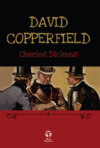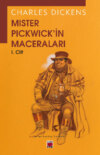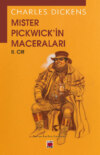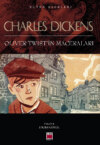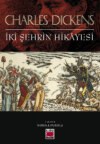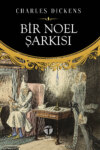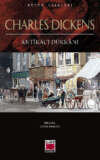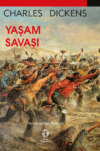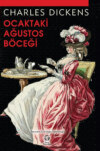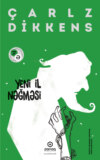Kitabı oku: «Pictures from Italy», sayfa 9
Taking to our wheels again, soon afterwards, we began rapidly to descend; passing under everlasting glaciers, by means of arched galleries, hung with clusters of dripping icicles; under and over foaming waterfalls; near places of refuge, and galleries of shelter against sudden danger; through caverns over whose arched roofs the avalanches slide, in spring, and bury themselves in the unknown gulf beneath. Down, over lofty bridges, and through horrible ravines: a little shifting speck in the vast desolation of ice and snow, and monstrous granite rocks; down through the deep Gorge of the Saltine, and deafened by the torrent plunging madly down, among the riven blocks of rock, into the level country, far below. Gradually down, by zig-zag roads, lying between an upward and a downward precipice, into warmer weather, calmer air, and softer scenery, until there lay before us, glittering like gold or silver in the thaw and sunshine, the metal-covered, red, green, yellow, domes and church-spires of a Swiss town.
The business of these recollections being with Italy, and my business, consequently, being to scamper back thither as fast as possible, I will not recall (though I am sorely tempted) how the Swiss villages, clustered at the feet of Giant mountains, looked like playthings; or how confusedly the houses were heaped and piled together; or how there were very narrow streets to shut the howling winds out in the winter-time; and broken bridges, which the impetuous torrents, suddenly released in spring, had swept away. Or how there were peasant women here, with great round fur caps: looking, when they peeped out of casements and only their heads were seen, like a population of Sword-bearers to the Lord Mayor of London; or how the town of Vevey, lying on the smooth lake of Geneva, was beautiful to see; or how the statue of Saint Peter in the street at Fribourg, grasps the largest key that ever was beheld; or how Fribourg is illustrious for its two suspension bridges, and its grand cathedral organ.
Or how, between that town and Bâle, the road meandered among thriving villages of wooden cottages, with overhanging thatched roofs, and low protruding windows, glazed with small round panes of glass like crown-pieces; or how, in every little Swiss homestead, with its cart or waggon carefully stowed away beside the house, its little garden, stock of poultry, and groups of red-cheeked children, there was an air of comfort, very new and very pleasant after Italy; or how the dresses of the women changed again, and there were no more sword-bearers to be seen; and fair white stomachers, and great black, fan-shaped, gauzy-looking caps, prevailed instead.
Or how the country by the Jura mountains, sprinkled with snow, and lighted by the moon, and musical with falling water, was delightful; or how, below the windows of the great hotel of the Three Kings at Bâle, the swollen Rhine ran fast and green; or how, at Strasbourg, it was quite as fast but not as green: and was said to be foggy lower down: and, at that late time of the year, was a far less certain means of progress, than the highway road to Paris.
Or how Strasbourg itself, in its magnificent old Gothic Cathedral, and its ancient houses with their peaked roofs and gables, made a little gallery of quaint and interesting views; or how a crowd was gathered inside the cathedral at noon, to see the famous mechanical clock in motion, striking twelve. How, when it struck twelve, a whole army of puppets went through many ingenious evolutions; and, among them, a huge puppet-cock, perched on the top, crowed twelve times, loud and clear. Or how it was wonderful to see this cock at great pains to clap its wings, and strain its throat; but obviously having no connection whatever with its own voice; which was deep within the clock, a long way down.
Or how the road to Paris, was one sea of mud, and thence to the coast, a little better for a hard frost. Or how the cliffs of Dover were a pleasant sight, and England was so wonderfully neat – though dark, and lacking colour on a winter’s day, it must be conceded.
Or how, a few days afterwards, it was cool, re-crossing the channel, with ice upon the decks, and snow lying pretty deep in France. Or how the Malle Poste scrambled through the snow, headlong, drawn in the hilly parts by any number of stout horses at a canter; or how there were, outside the Post-office Yard in Paris, before daybreak, extraordinary adventurers in heaps of rags, groping in the snowy streets with little rakes, in search of odds and ends.
Or how, between Paris and Marseilles, the snow being then exceeding deep, a thaw came on, and the mail waded rather than rolled for the next three hundred miles or so; breaking springs on Sunday nights, and putting out its two passengers to warm and refresh themselves pending the repairs, in miserable billiard-rooms, where hairy company, collected about stoves, were playing cards; the cards being very like themselves – extremely limp and dirty.
Or how there was detention at Marseilles from stress of weather; and steamers were advertised to go, which did not go; or how the good Steam-packet Charlemagne at length put out, and met such weather that now she threatened to run into Toulon, and now into Nice, but, the wind moderating, did neither, but ran on into Genoa harbour instead, where the familiar Bells rang sweetly in my ear. Or how there was a travelling party on board, of whom one member was very ill in the cabin next to mine, and being ill was cross, and therefore declined to give up the Dictionary, which he kept under his pillow; thereby obliging his companions to come down to him, constantly, to ask what was the Italian for a lump of sugar – a glass of brandy and water – what’s o’clock? and so forth: which he always insisted on looking out, with his own sea-sick eyes, declining to entrust the book to any man alive.
Like Grumio, I might have told you, in detail, all this and something more – but to as little purpose – were I not deterred by the remembrance that my business is with Italy. Therefore, like Grumio’s story, ‘it shall die in oblivion.’
TO ROME BY PISA AND SIENA
There is nothing in Italy, more beautiful to me, than the coast-road between Genoa and Spezzia. On one side: sometimes far below, sometimes nearly on a level with the road, and often skirted by broken rocks of many shapes: there is the free blue sea, with here and there a picturesque felucca gliding slowly on; on the other side are lofty hills, ravines besprinkled with white cottages, patches of dark olive woods, country churches with their light open towers, and country houses gaily painted. On every bank and knoll by the wayside, the wild cactus and aloe flourish in exuberant profusion; and the gardens of the bright villages along the road, are seen, all blushing in the summer-time with clusters of the Belladonna, and are fragrant in the autumn and winter with golden oranges and lemons.
Some of the villages are inhabited, almost exclusively, by fishermen; and it is pleasant to see their great boats hauled up on the beach, making little patches of shade, where they lie asleep, or where the women and children sit romping and looking out to sea, while they mend their nets upon the shore. There is one town, Camoglia, with its little harbour on the sea, hundreds of feet below the road; where families of mariners live, who, time out of mind, have owned coasting-vessels in that place, and have traded to Spain and elsewhere. Seen from the road above, it is like a tiny model on the margin of the dimpled water, shining in the sun. Descended into, by the winding mule-tracks, it is a perfect miniature of a primitive seafaring town; the saltest, roughest, most piratical little place that ever was seen. Great rusty iron rings and mooring-chains, capstans, and fragments of old masts and spars, choke up the way; hardy rough-weather boats, and seamen’s clothing, flutter in the little harbour or are drawn out on the sunny stones to dry; on the parapet of the rude pier, a few amphibious-looking fellows lie asleep, with their legs dangling over the wall, as though earth or water were all one to them, and if they slipped in, they would float away, dozing comfortably among the fishes; the church is bright with trophies of the sea, and votive offerings, in commemoration of escape from storm and shipwreck. The dwellings not immediately abutting on the harbour are approached by blind low archways, and by crooked steps, as if in darkness and in difficulty of access they should be like holds of ships, or inconvenient cabins under water; and everywhere, there is a smell of fish, and sea-weed, and old rope.
The coast-road whence Camoglia is descried so far below, is famous, in the warm season, especially in some parts near Genoa, for fire-flies. Walking there on a dark night, I have seen it made one sparkling firmament by these beautiful insects: so that the distant stars were pale against the flash and glitter that spangled every olive wood and hill-side, and pervaded the whole air.
It was not in such a season, however, that we traversed this road on our way to Rome. The middle of January was only just past, and it was very gloomy and dark weather; very wet besides. In crossing the fine pass of Bracco, we encountered such a storm of mist and rain, that we travelled in a cloud the whole way. There might have been no Mediterranean in the world, for anything that we saw of it there, except when a sudden gust of wind, clearing the mist before it, for a moment, showed the agitated sea at a great depth below, lashing the distant rocks, and spouting up its foam furiously. The rain was incessant; every brook and torrent was greatly swollen; and such a deafening leaping, and roaring, and thundering of water, I never heard the like of in my life.
Hence, when we came to Spezzia, we found that the Magra, an unbridged river on the high-road to Pisa, was too high to be safely crossed in the Ferry Boat, and were fain to wait until the afternoon of next day, when it had, in some degree, subsided. Spezzia, however, is a good place to tarry at; by reason, firstly, of its beautiful bay; secondly, of its ghostly Inn; thirdly, of the head-dress of the women, who wear, on one side of their head, a small doll’s straw hat, stuck on to the hair; which is certainly the oddest and most roguish head-gear that ever was invented.
The Magra safely crossed in the Ferry Boat – the passage is not by any means agreeable, when the current is swollen and strong – we arrived at Carrara, within a few hours. In good time next morning, we got some ponies, and went out to see the marble quarries.
They are four or five great glens, running up into a range of lofty hills, until they can run no longer, and are stopped by being abruptly strangled by Nature. The quarries, ‘or caves,’ as they call them there, are so many openings, high up in the hills, on either side of these passes, where they blast and excavate for marble: which may turn out good or bad: may make a man’s fortune very quickly, or ruin him by the great expense of working what is worth nothing. Some of these caves were opened by the ancient Romans, and remain as they left them to this hour. Many others are being worked at this moment; others are to be begun to-morrow, next week, next month; others are unbought, unthought of; and marble enough for more ages than have passed since the place was resorted to, lies hidden everywhere: patiently awaiting its time of discovery.
As you toil and clamber up one of these steep gorges (having left your pony soddening his girths in water, a mile or two lower down) you hear, every now and then, echoing among the hills, in a low tone, more silent than the previous silence, a melancholy warning bugle, – a signal to the miners to withdraw. Then, there is a thundering, and echoing from hill to hill, and perhaps a splashing up of great fragments of rock into the air; and on you toil again until some other bugle sounds, in a new direction, and you stop directly, lest you should come within the range of the new explosion.
There were numbers of men, working high up in these hills – on the sides – clearing away, and sending down the broken masses of stone and earth, to make way for the blocks of marble that had been discovered. As these came rolling down from unseen hands into the narrow valley, I could not help thinking of the deep glen (just the same sort of glen) where the Roc left Sindbad the Sailor; and where the merchants from the heights above, flung down great pieces of meat for the diamonds to stick to. There were no eagles here, to darken the sun in their swoop, and pounce upon them; but it was as wild and fierce as if there had been hundreds.
But the road, the road down which the marble comes, however immense the blocks! The genius of the country, and the spirit of its institutions, pave that road: repair it, watch it, keep it going! Conceive a channel of water running over a rocky bed, beset with great heaps of stone of all shapes and sizes, winding down the middle of this valley; and that being the road – because it was the road five hundred years ago! Imagine the clumsy carts of five hundred years ago, being used to this hour, and drawn, as they used to be, five hundred years ago, by oxen, whose ancestors were worn to death five hundred years ago, as their unhappy descendants are now, in twelve months, by the suffering and agony of this cruel work! Two pair, four pair, ten pair, twenty pair, to one block, according to its size; down it must come, this way. In their struggling from stone to stone, with their enormous loads behind them, they die frequently upon the spot; and not they alone; for their passionate drivers, sometimes tumbling down in their energy, are crushed to death beneath the wheels. But it was good five hundred years ago, and it must be good now: and a railroad down one of these steeps (the easiest thing in the world) would be flat blasphemy.
When we stood aside, to see one of these cars drawn by only a pair of oxen (for it had but one small block of marble on it), coming down, I hailed, in my heart, the man who sat upon the heavy yoke, to keep it on the neck of the poor beasts – and who faced backwards: not before him – as the very Devil of true despotism. He had a great rod in his hand, with an iron point; and when they could plough and force their way through the loose bed of the torrent no longer, and came to a stop, he poked it into their bodies, beat it on their heads, screwed it round and round in their nostrils, got them on a yard or two, in the madness of intense pain; repeated all these persuasions, with increased intensity of purpose, when they stopped again; got them on, once more; forced and goaded them to an abrupter point of the descent; and when their writhing and smarting, and the weight behind them, bore them plunging down the precipice in a cloud of scattered water, whirled his rod above his head, and gave a great whoop and hallo, as if he had achieved something, and had no idea that they might shake him off, and blindly mash his brains upon the road, in the noontide of his triumph.
Standing in one of the many studii of Carrara, that afternoon – for it is a great workshop, full of beautifully-finished copies in marble, of almost every figure, group, and bust, we know – it seemed, at first, so strange to me that those exquisite shapes, replete with grace, and thought, and delicate repose, should grow out of all this toil, and sweat, and torture! But I soon found a parallel to it, and an explanation of it, in every virtue that springs up in miserable ground, and every good thing that has its birth in sorrow and distress. And, looking out of the sculptor’s great window, upon the marble mountains, all red and glowing in the decline of day, but stern and solemn to the last, I thought, my God! how many quarries of human hearts and souls, capable of far more beautiful results, are left shut up and mouldering away: while pleasure-travellers through life, avert their faces, as they pass, and shudder at the gloom and ruggedness that conceal them!
The then reigning Duke of Modena, to whom this territory in part belonged, claimed the proud distinction of being the only sovereign in Europe who had not recognised Louis-Philippe as King of the French! He was not a wag, but quite in earnest. He was also much opposed to railroads; and if certain lines in contemplation by other potentates, on either side of him, had been executed, would have probably enjoyed the satisfaction of having an omnibus plying to and fro across his not very vast dominions, to forward travellers from one terminus to another.
Carrara, shut in by great hills, is very picturesque and bold. Few tourists stay there; and the people are nearly all connected, in one way or other, with the working of marble. There are also villages among the caves, where the workmen live. It contains a beautiful little Theatre, newly built; and it is an interesting custom there, to form the chorus of labourers in the marble quarries, who are self-taught and sing by ear. I heard them in a comic opera, and in an act of ‘Norma;’ and they acquitted themselves very well; unlike the common people of Italy generally, who (with some exceptions among the Neapolitans) sing vilely out of tune, and have very disagreeable singing voices.
From the summit of a lofty hill beyond Carrara, the first view of the fertile plain in which the town of Pisa lies – with Leghorn, a purple spot in the flat distance – is enchanting. Nor is it only distance that lends enchantment to the view; for the fruitful country, and rich woods of olive-trees through which the road subsequently passes, render it delightful.
The moon was shining when we approached Pisa, and for a long time we could see, behind the wall, the leaning Tower, all awry in the uncertain light; the shadowy original of the old pictures in school-books, setting forth ‘The Wonders of the World.’ Like most things connected in their first associations with school-books and school-times, it was too small. I felt it keenly. It was nothing like so high above the wall as I had hoped. It was another of the many deceptions practised by Mr. Harris, Bookseller, at the corner of St. Paul’s Churchyard, London. His Tower was a fiction, but this was a reality – and, by comparison, a short reality. Still, it looked very well, and very strange, and was quite as much out of the perpendicular as Harris had represented it to be. The quiet air of Pisa too; the big guard-house at the gate, with only two little soldiers in it; the streets with scarcely any show of people in them; and the Arno, flowing quaintly through the centre of the town; were excellent. So, I bore no malice in my heart against Mr. Harris (remembering his good intentions), but forgave him before dinner, and went out, full of confidence, to see the Tower next morning.
I might have known better; but, somehow, I had expected to see it, casting its long shadow on a public street where people came and went all day. It was a surprise to me to find it in a grave retired place, apart from the general resort, and carpeted with smooth green turf. But, the group of buildings, clustered on and about this verdant carpet: comprising the Tower, the Baptistery, the Cathedral, and the Church of the Campo Santo: is perhaps the most remarkable and beautiful in the whole world; and from being clustered there, together, away from the ordinary transactions and details of the town, they have a singularly venerable and impressive character. It is the architectural essence of a rich old city, with all its common life and common habitations pressed out, and filtered away.
Simond compares the Tower to the usual pictorial representations in children’s books of the Tower of Babel. It is a happy simile, and conveys a better idea of the building than chapters of laboured description. Nothing can exceed the grace and lightness of the structure; nothing can be more remarkable than its general appearance. In the course of the ascent to the top (which is by an easy staircase), the inclination is not very apparent; but, at the summit, it becomes so, and gives one the sensation of being in a ship that has heeled over, through the action of an ebb-tide. The effect upon the low side, so to speak – looking over from the gallery, and seeing the shaft recede to its base – is very startling; and I saw a nervous traveller hold on to the Tower involuntarily, after glancing down, as if he had some idea of propping it up. The view within, from the ground – looking up, as through a slanted tube – is also very curious. It certainly inclines as much as the most sanguine tourist could desire. The natural impulse of ninety-nine people out of a hundred, who were about to recline upon the grass below it, to rest, and contemplate the adjacent buildings, would probably be, not to take up their position under the leaning side; it is so very much aslant.
The manifold beauties of the Cathedral and Baptistery need no recapitulation from me; though in this case, as in a hundred others, I find it difficult to separate my own delight in recalling them, from your weariness in having them recalled. There is a picture of St. Agnes, by Andrea del Sarto, in the former, and there are a variety of rich columns in the latter, that tempt me strongly.
It is, I hope, no breach of my resolution not to be tempted into elaborate descriptions, to remember the Campo Santo; where grass-grown graves are dug in earth brought more than six hundred years ago, from the Holy Land; and where there are, surrounding them, such cloisters, with such playing lights and shadows falling through their delicate tracery on the stone pavement, as surely the dullest memory could never forget. On the walls of this solemn and lovely place, are ancient frescoes, very much obliterated and decayed, but very curious. As usually happens in almost any collection of paintings, of any sort, in Italy, where there are many heads, there is, in one of them, a striking accidental likeness of Napoleon. At one time, I used to please my fancy with the speculation whether these old painters, at their work, had a foreboding knowledge of the man who would one day arise to wreak such destruction upon art: whose soldiers would make targets of great pictures, and stable their horses among triumphs of architecture. But the same Corsican face is so plentiful in some parts of Italy at this day, that a more commonplace solution of the coincidence is unavoidable.
If Pisa be the seventh wonder of the world in right of its Tower, it may claim to be, at least, the second or third in right of its beggars. They waylay the unhappy visitor at every turn, escort him to every door he enters at, and lie in wait for him, with strong reinforcements, at every door by which they know he must come out. The grating of the portal on its hinges is the signal for a general shout, and the moment he appears, he is hemmed in, and fallen on, by heaps of rags and personal distortions. The beggars seem to embody all the trade and enterprise of Pisa. Nothing else is stirring, but warm air. Going through the streets, the fronts of the sleepy houses look like backs. They are all so still and quiet, and unlike houses with people in them, that the greater part of the city has the appearance of a city at daybreak, or during a general siesta of the population. Or it is yet more like those backgrounds of houses in common prints, or old engravings, where windows and doors are squarely indicated, and one figure (a beggar of course) is seen walking off by itself into illimitable perspective.
Not so Leghorn (made illustrious by Smollett’s grave), which is a thriving, business-like, matter-of-fact place, where idleness is shouldered out of the way by commerce. The regulations observed there, in reference to trade and merchants, are very liberal and free; and the town, of course, benefits by them. Leghorn had a bad name in connection with stabbers, and with some justice it must be allowed; for, not many years ago, there was an assassination club there, the members of which bore no ill-will to anybody in particular, but stabbed people (quite strangers to them) in the streets at night, for the pleasure and excitement of the recreation. I think the president of this amiable society was a shoemaker. He was taken, however, and the club was broken up. It would, probably, have disappeared in the natural course of events, before the railroad between Leghorn and Pisa, which is a good one, and has already begun to astonish Italy with a precedent of punctuality, order, plain dealing, and improvement – the most dangerous and heretical astonisher of all. There must have been a slight sensation, as of earthquake, surely, in the Vatican, when the first Italian railroad was thrown open.
Returning to Pisa, and hiring a good-tempered Vetturíno, and his four horses, to take us on to Rome, we travelled through pleasant Tuscan villages and cheerful scenery all day. The roadside crosses in this part of Italy are numerous and curious. There is seldom a figure on the cross, though there is sometimes a face, but they are remarkable for being garnished with little models in wood, of every possible object that can be connected with the Saviour’s death. The cock that crowed when Peter had denied his Master thrice, is usually perched on the tip-top; and an ornithological phenomenon he generally is. Under him, is the inscription. Then, hung on to the cross-beam, are the spear, the reed with the sponge of vinegar and water at the end, the coat without seam for which the soldiers cast lots, the dice-box with which they threw for it, the hammer that drove in the nails, the pincers that pulled them out, the ladder which was set against the cross, the crown of thorns, the instrument of flagellation, the lanthorn with which Mary went to the tomb (I suppose), and the sword with which Peter smote the servant of the high priest, – a perfect toy-shop of little objects, repeated at every four or five miles, all along the highway.
On the evening of the second day from Pisa, we reached the beautiful old city of Siena. There was what they called a Carnival, in progress; but, as its secret lay in a score or two of melancholy people walking up and down the principal street in common toy-shop masks, and being more melancholy, if possible, than the same sort of people in England, I say no more of it. We went off, betimes next morning, to see the Cathedral, which is wonderfully picturesque inside and out, especially the latter – also the market-place, or great Piazza, which is a large square, with a great broken-nosed fountain in it: some quaint Gothic houses: and a high square brick tower; outside the top of which – a curious feature in such views in Italy – hangs an enormous bell. It is like a bit of Venice, without the water. There are some curious old Palazzi in the town, which is very ancient; and without having (for me) the interest of Verona, or Genoa, it is very dreamy and fantastic, and most interesting.
We went on again, as soon as we had seen these things, and going over a rather bleak country (there had been nothing but vines until now: mere walking-sticks at that season of the year), stopped, as usual, between one and two hours in the middle of the day, to rest the horses; that being a part of every Vetturíno contract. We then went on again, through a region gradually becoming bleaker and wilder, until it became as bare and desolate as any Scottish moors. Soon after dark, we halted for the night, at the osteria of La Scala: a perfectly lone house, where the family were sitting round a great fire in the kitchen, raised on a stone platform three or four feet high, and big enough for the roasting of an ox. On the upper, and only other floor of this hotel, there was a great, wild, rambling sála, with one very little window in a by-corner, and four black doors opening into four black bedrooms in various directions. To say nothing of another large black door, opening into another large black sála, with the staircase coming abruptly through a kind of trap-door in the floor, and the rafters of the roof looming above: a suspicious little press skulking in one obscure corner: and all the knives in the house lying about in various directions. The fireplace was of the purest Italian architecture, so that it was perfectly impossible to see it for the smoke. The waitress was like a dramatic brigand’s wife, and wore the same style of dress upon her head. The dogs barked like mad; the echoes returned the compliments bestowed upon them; there was not another house within twelve miles; and things had a dreary, and rather a cut-throat, appearance.
They were not improved by rumours of robbers having come out, strong and boldly, within a few nights; and of their having stopped the mail very near that place. They were known to have waylaid some travellers not long before, on Mount Vesuvius itself, and were the talk at all the roadside inns. As they were no business of ours, however (for we had very little with us to lose), we made ourselves merry on the subject, and were very soon as comfortable as need be. We had the usual dinner in this solitary house; and a very good dinner it is, when you are used to it. There is something with a vegetable or some rice in it which is a sort of shorthand or arbitrary character for soup, and which tastes very well, when you have flavoured it with plenty of grated cheese, lots of salt, and abundance of pepper. There is the half fowl of which this soup has been made. There is a stewed pigeon, with the gizzards and livers of himself and other birds stuck all round him. There is a bit of roast beef, the size of a small French roll. There are a scrap of Parmesan cheese, and five little withered apples, all huddled together on a small plate, and crowding one upon the other, as if each were trying to save itself from the chance of being eaten. Then there is coffee; and then there is bed. You don’t mind brick floors; you don’t mind yawning doors, nor banging windows; you don’t mind your own horses being stabled under the bed: and so close, that every time a horse coughs or sneezes, he wakes you. If you are good-humoured to the people about you, and speak pleasantly, and look cheerful, take my word for it you may be well entertained in the very worst Italian Inn, and always in the most obliging manner, and may go from one end of the country to the other (despite all stories to the contrary) without any great trial of your patience anywhere. Especially, when you get such wine in flasks, as the Orvieto, and the Monte Pulciano.

